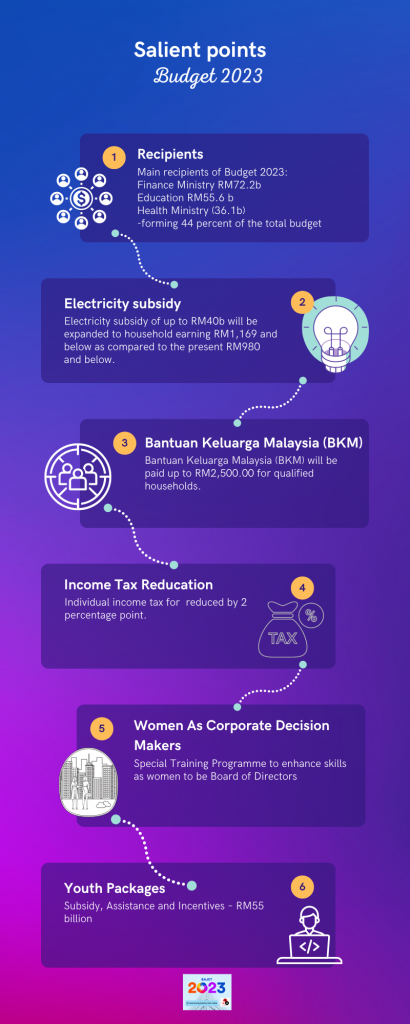Despite the government taking a cautious approach to a “challenging” 2023 due to political tensions, rising global inflation, tightening financial conditions, and supply chain disruptions, with GE15 in the cards, the citizens will benefit from the Budget allocations
Kuala Lumpur — The 2023 Budget aims to provide favourable conditions and ensure a balance between economic needs and fiscal consolidation, Finance Minister Tengku Zafrul Aziz said, despite cries by the Opposition that it’s an election budget meant to swing the voters.

Zafrul said the government was taking a cautious approach to a “challenging” 2023 due to political tensions, rising global inflation, tightening financial conditions, and supply chain disruptions.
“Budget 2023 will continue to provide substantial support to the economy with a total allocation of RM372.3 billion or 20.5 per cent of the gross domestic product (GDP).
“Of the amount, RM272.3 billion or 73.1 per cent will be allocated for operating expenditure (opex), and RM95 billion or 25.5 per cent for development expenditure (DE),” Malaysian National News Agency (Bernama) quoted Zafrul as saying.
Additionally, the remaining RM5 billion is for outstanding payments of the Covid-19 Fund commitments made in 2022 as stipulated in Section 8(1), Temporary Measures for Government Financing (Coronavirus Disease (Covid-19)) Act 2020.
Sectoral Allocation

NMH infographics by DH
“In terms of sectoral allocation, 37.2 per cent (of Budget 2023) is allocated for programmes and projects under the social sector, followed by the economic (19.5 per cent), security (9.9 per cent), and general administration (5.5 per cent) sectors, and 27.9 per cent is allocated for charged expenditures and transfer payments.
“The top three recipients of Budget 2023 are the finance ministry (RM67.2 billion), education ministry (RM55.6 billion) and health ministry (RM36.1 billion), constituting 43.3 per cent of total expenditure,” Bernama reported referring to the 2023 Fiscal Outlook and Federal Government Revenue Estimates report released Friday (07 Oct).
The finance ministry said the allocation for opex is estimated at RM272.3 billion or 15 per cent of the GDP in 2023, which is slightly lower by 4.3 per cent compared with Budget 2022 due to reduced allocation for subsidies and social assistance following the expected moderation in commodity prices and the gradual implementation of targeted subsidy mechanism.
Higher allocation is provided for emoluments, retirement charges, debt service charges (DSC) and grants to statutory bodies.
Emoluments for civil servants remain the largest component, constituting 33.3 per cent of the opex, the finance ministry said in the report.
“The component is estimated to increase by 4.9 per cent to RM90.8 billion, mainly due to provision of special annual salary increment for civil servants as well as absorption of contract officers to permanent positions, particularly in the health and education services,” it said.
Ageing Nation
Retirement charges are estimated to increase by 1.4 per cent to RM29.1 billion representing 10.7 per cent of the total opex.
A total of RM21.9 billion or 75.3 per cent of retirement charges comprise pension payments for about 958,700 pensioners and beneficiaries, while the remaining are mainly for gratuity payments and cash awards in lieu of accumulated leaves.
“As Malaysia is now an ageing nation based on the definition by the United Nations (UN), pension liabilities are expected to expand further. Therefore, the government is exploring options to efficiently manage future pension obligations.
“As stipulated in the Federal Constitution, the DSC is a charged item that must be prioritised before all other Opex, and it is estimated to grow by 7 per cent to RM46.1 billion in tandem with higher financing needs for DE and Covid-19 Fund,” the report said.
Of the amount, 98.4 per cent is allocated for the payment of coupons on domestic debts, particularly Malaysian Government Securities (MGS) and Malaysian Government Investment Issues (MGII), while the balance is for offshore loans.
The DSC ratio-to-revenue is estimated at 16.9 per cent, compared to the 15 per cent threshold in accordance with international best practices.
The finance ministry added that supplies and services, which represent 11.8 per cent of the total Opex, are expected to decline by 3.8 per cent to RM32 billion, due to the government’s initiative to absorb contract personnel into the service, resulting in the shift of allocation from supplies and services to emoluments.
Budget Grants Increased
Allocation for grants to statutory bodies is increased by 12.1 to RM15.1 billion.
Meanwhile, it also said that the health ministry will receive the highest allocation for supplies and services (35 per cent), mainly for the procurement of medical supplies and professional services as well as for repairs and maintenance.
Subsidies and social assistance are projected at RM42 billion, mainly for fuel and agriculture-related subsidies; cash and welfare assistance; toll compensation; as well as education-related assistance.
Fuel subsidies are estimated to decline with the expectation of lower global crude oil prices in 2023, averaging at USD90 per barrel, as well as in line with the gradual move towards targeted subsidies in ensuring economic efficiency and equitable distribution of resources. — NMH
New Malaysia Herald publishes articles, comments and posts from various contributors. We always welcome new content and write up. If you would like to contribute please contact us at : editor@newmalaysiaherald.com
Facebook Comments